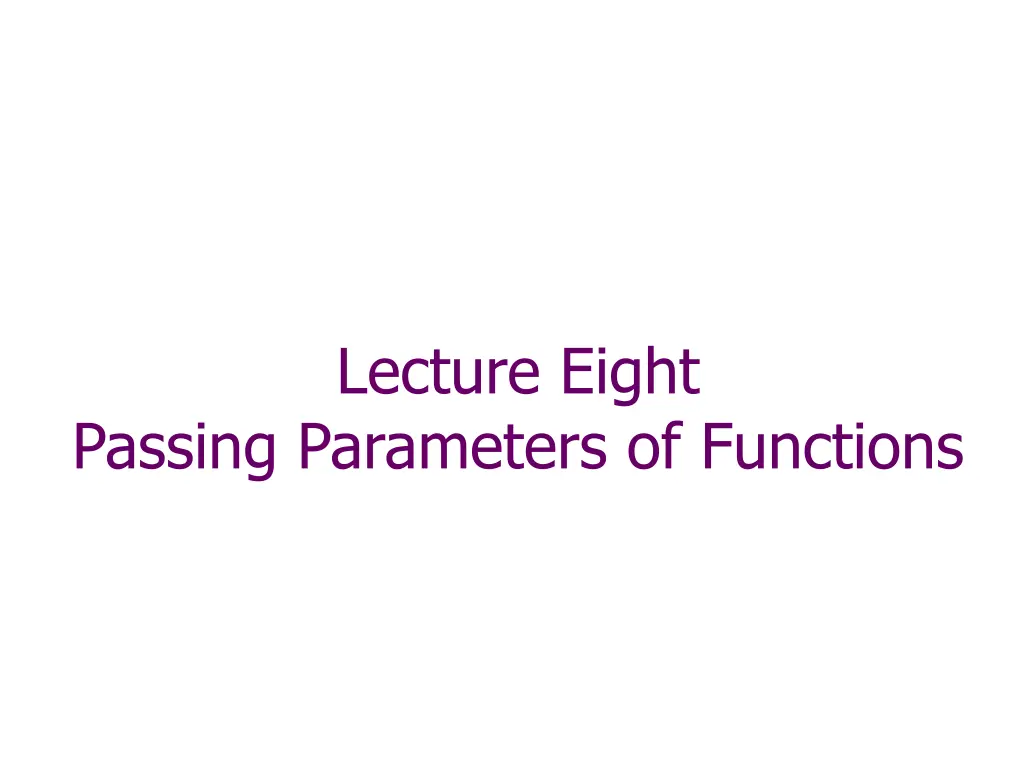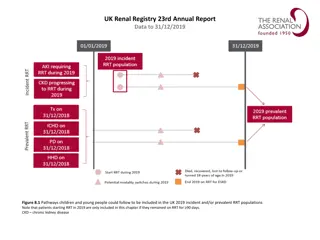
Understanding Function Parameter Passing in Programming
Learn about passing parameters to functions in programming, covering call by value and call by pointer methods. Discover how arguments are handled and manipulated within functions, with examples and illustrations provided.
Download Presentation

Please find below an Image/Link to download the presentation.
The content on the website is provided AS IS for your information and personal use only. It may not be sold, licensed, or shared on other websites without obtaining consent from the author. If you encounter any issues during the download, it is possible that the publisher has removed the file from their server.
You are allowed to download the files provided on this website for personal or commercial use, subject to the condition that they are used lawfully. All files are the property of their respective owners.
The content on the website is provided AS IS for your information and personal use only. It may not be sold, licensed, or shared on other websites without obtaining consent from the author.
E N D
Presentation Transcript
Lecture Eight Passing Parameters of Functions
Function Arguments If a function is to use arguments, it must declare variables that accept the values of the arguments. These variables are called the formal parameters of the function. The formal parameters behave like other local variables inside the function and are created upon entry into the function and destroyed upon exit. Data Structure 2 Wednesday, May 28, 2025
Function Arguments 1. Call by Value The call by value method of passing arguments to a function copies the actual value of an argument into the formal parameter of the function. In this case, changes made to the parameter inside the function have no effect on the argument. By default, C++ uses call by value to pass arguments. The code within a function cannot alter the arguments used to call the function. Data Structure 3 Wednesday, May 28, 2025
Example Copy values from the call to the formal parameter void func(int i); int main( ) { int a = 5; func(a); } void func(int i) { i = i + 1; } Wednesday, May 28, 2025 Data Structure 4
Function Arguments #include <iostream> void swap(int x, int y); int main () { int a = 100; int b = 200; cout << "Before swap, value of a :" << a << endl; cout << "Before swap, value of b :" << b << endl; // calling a function to swap the values. swap(a, b); cout << "After swap, value of a :" << a << endl; cout << "After swap, value of b :" << b << endl; return 0;} void swap(int x, int y) { int temp; temp = x; /* save the value of x */ x = y; /* put y into x */ y = temp; /* put x into y */ return;} Data Structure 5 Wednesday, May 28, 2025
Address Operators Memory content versus memory address int i; int *p = &i; i = 10; *p is now 10 Wednesday, May 28, 2025 Data Structure 6
Function Arguments 2. Call by Pointer The call by pointer method of passing arguments to a function copies the address of an argument into the formal parameter. Inside the function, the address is used to access the actual argument used in the call. This means that changes made to the parameter affect the passed argument. To pass the value by pointer, argument pointers are passed to the functions just like any other value. So accordingly you need to declare the function parameters as pointer types. Data Structure 7 Wednesday, May 28, 2025
Call by Pointer Example Pass by address is used When a function must change its argument To increase efficiency when passing large data types void func(int* i); void main( ) { int b = 10; func(&b); } void func(int* i) { *i = *i + 10; } Wednesday, May 28, 2025 Data Structure 8
Function Arguments #include <iostream> void swap(int *x, int *y); int main () { int a = 100; int b = 200; cout << "Before swap, value of a :" << a << endl; cout << "Before swap, value of b :" << b << endl; swap(&a, &b); cout << "After swap, value of a :" << a << endl; cout << "After swap, value of b :" << b << endl; return 0;} void swap(int *x, int *y) { int temp; temp = *x; /* save the value at address x */ *x = *y; /* put y into x */ *y = temp; /* put x into y */ return;} Data Structure 9 Wednesday, May 28, 2025
Function Arguments 3. Call by Reference The call by reference method of passing arguments to a function copies the reference of an argument into the formal parameter. Inside the function, the reference is used to access the actual argument used in the call. This means that changes made to the parameter affect the passed argument. Data Structure 10 Wednesday, May 28, 2025
Call By Reference void func(int& i); int main( ) { int c = 5; func(c); } void func(int& i) { i = i + 1; } Wednesday, May 28, 2025 Data Structure 11
Call by Reference Example Pass the address of an object Provides efficiency (especially for large objects) Propagate parameter changes to the calling function Creates an alias (i.e., two names for the same memory location) Do not have the safety of a pass by value One place to modify syntax Function definition (from value to reference variable) Wednesday, May 28, 2025 Data Structure 12
Function Arguments #include <iostream> void swap(int &x, int &y); int main (){ int a = 100; int b = 200; cout << "Before swap, value of a :" << a << endl; cout << "Before swap, value of b :" << b << endl; /* calling a function to swap the values using variable reference.*/ swap(a, b); cout << "After swap, value of a :" << a << endl; cout << "After swap, value of b :" << b << endl; return 0;} // function definition to swap the values. void swap(int &x, int &y) { int temp; temp = x; /* save the value at address x */ x = y; /* put y into x */ y = temp; /* put x into y */ return;} Data Structure 13 Wednesday, May 28, 2025
Arrays as parameters of functions int main() { double values[4] = {3.14, 1.0, 2.61, 5.3}; cout<< Sum = %lf\n , SumValues( values, 4)); } Suppose we want a function that sums up values of the array Wednesday, May 28, 2025 Data Structure 14
Arrays as parameters of functions double SumValues(double x[], int numElements) { int i; double result = 0; for (i=0; i < numElements; i++) result = result + x[i]; return result; } [] flags the parameter as an array. always passed by reference Array size is passed separately (as numElements) Wednesday, May 28, 2025 Data Structure 15
Array before sorting Element 0 : 58.7000 Element 1 : 8.0100 Element 2 : 72.3700 Element 3 : 4.6500 Element 4 : 58.3000 Element 5 : 92.1700 Element 6 : 95.3100 Element 7 : 4.3100 Element 8 : 68.0200 Element 9 : 72.5400 Sample output : The array elements are randomly generated Array after sorting Element 0 : 4.3100 Element 1 : 4.6500 Element 2 : 8.0100 Element 3 : 58.3000 Element 4 : 58.7000 Element 5 : 68.0200 Element 6 : 72.3700 Element 7 : 72.5400 Element 8 : 92.1700 Element 9 : 95.3100 Wednesday, May 28, 2025 Data Structure 16
#include <stdio.h> #include <stdlib.h> Functions are your friends! Make them work and then use them to do work! void PrintArray( double [], int ); void SortArray( double [], int ); void Swap (double *, double *); Wednesday, May 28, 2025 Data Structure 17
#define NumElements 10 int main() { int i; double values[NumElements]; /* The array of real numbers */ srand(time(NULL)); for (i=0; i < NumElements; i++) { values[i] = (double)(rand() % 10000) / 100.0; } cout<<"\nArray before sorting\n"); PrintArray( values, NumElements ); SortArray( values, NumElements ); cout<<"\nArray after sorting\n"); PrintArray( values, NumElements ); return 0; } Wednesday, May 28, 2025 Data Structure 18
#define NumElements 10 Array declaration Declare an array of 10 doubles The indices range from 0 to 9, i.e. Value[0] to Value[9] int main() { int i; double values[NumElements]; /* The array of real numbers */ srand(time(NULL)); for (i=0; i < NumElements; i++) { values[i] = (double)(rand() % 10000) / 100.0; } cout<<"\nArray before sorting\n"); PrintArray( values, NumElements ); SortArray( values, NumElements ); cout<<"\nArray after sorting\n"); PrintArray( values, NumElements ); return 0; } Wednesday, May 28, 2025 Data Structure 19
#define NumElements 10 int main() { int i; double values[NumElements]; /* The array of real numbers */ srand(time(NULL)); for (i=0; i < NumElements; i++) { values[i] = (double)(rand() % 10000) / 100.0; } cout<<"\nArray before sorting\n"); PrintArray( values, NumElements ); SortArray( values, NumElements ); cout<<"\nArray after sorting\n"); PrintArray( values, NumElements ); /100.0 moves the decimal point left 2 places So, Values is an array of randomly generated 2-decimal digit numbers between 0.00 and 99.99 Initialize the array with random values rand() returns a pseudo random number between 0 and RAND_MAX rand()%10000 yields a four-digit integer remainder return 0; } Wednesday, May 28, 2025 Data Structure 20
PrintArray prints the elements of the array in the order they are given to it cout<<"\nArray before sorting\n"); PrintArray( values, NumElements ); SortArray( values, NumElements ); SortArray sorts the elements into ascending order cout<<"\nArray after sorting\n"); PrintArray( values, NumElements ); Wednesday, May 28, 2025 Data Structure 21
Parameter Passing void PrintArray( double array[], int size ) { } array is an array of doubles array is passed by reference, i.e. any changes to parameter array in the function would change the argument values The array size is passed as size Wednesday, May 28, 2025 Data Structure 22
void PrintArray( double array[], int size ) { int i; for (i=0; i<size; i++) cout<<" Element %5d : %8.4lf\n",i, array[i]); } array[i] is a double so the output needs to be %f The range of the for statement walks through the whole array from element 0 to element N-1. Wednesday, May 28, 2025 Data Structure 23
Sorting Array void SortArray( double array[], int size) { } array is an array of doubles. array is passed by reference, i.e. changes to parameter array change the argument values There is no size restriction on array so the size is passed as size . Wednesday, May 28, 2025 Data Structure 24
SortArray void SortArray( double array[], int size) { int i, j, min; for (i=0; i < size-1; i++) { min = i; for (j=i+1; j<size; j++) { if (array[j] < array[min]) { min = j; } } Swap(&array[i], &array[min]); } } Wednesday, May 28, 2025 Data Structure 25
Swap void Swap (double *a, double *b) { double temp = *a; *a = *b; *b = temp; } Wednesday, May 28, 2025 Data Structure 26
Swap void Swap (double *a, double *b) { Note: We re passing two elements of the array; not passing the entire array double temp = *a; *a = *b; *b = temp; } So, we CANNOT declare it as void Swap(double a, double b) void Swap(double a[], double b[]) Data Structure 27 Wednesday, May 28, 2025
Passing 2d Arrays In passing a multi-dimensional array, the first array size does not have to be specified. The second (and any subsequent) dimensions must be given! int myFun(int list[][10]); Wednesday, May 28, 2025 Data Structure 28
#define ROWS 3 #define COLS 5 int addMatrix( int [ ][COLS] ); int main() { int a[][COLS] = { {13, 22, 9, 23, 12}, {17, 5, 24, 31, 55}, {4, 19, 29, 41, 61} }; printf( Sum = %d\n , addMatrix( a ) ); } int addMatrix( int t[ ][COLS] ) { int i, j, sum = 0; for (i=0; i<ROWS; i++) for (j=0; j<COLS; j++) sum += t[i][j]; return sum; } Wednesday, May 28, 2025 Data Structure 29
Recursive Functions Direct recursion: a function calls itself Indirect recursion: A calls B, B calls C, ..., Y calls Z, Z calls A Must have 3 features Branch (usually in an if) that makes the recursive call Branch (usually in an if) that does not recurse (i.e., terminates the recursion) --condition may be implicit rather than explicit Input must change with each call Theoretically, recursion may be written as a loop There is an existence proof of this but it s not a constructive proof Wednesday, May 28, 2025 Data Structure 30
Recursion Example 1 (Print the digits of an integer one at a time) void forward(int number) { if (number != 0) { forward(number / 10); cout << number % 10; } } Wednesday, May 28, 2025 Data Structure 31
Recursion Example 2 (Print the digits of an integer in reverse order) void reverse(int number) { if (number != 0) { cout << number % 10; reverse(number / 10); } } Wednesday, May 28, 2025 Data Structure 32
Graphical Representation Activation records and statement sequencing Wednesday, May 28, 2025 Data Structure 33






















